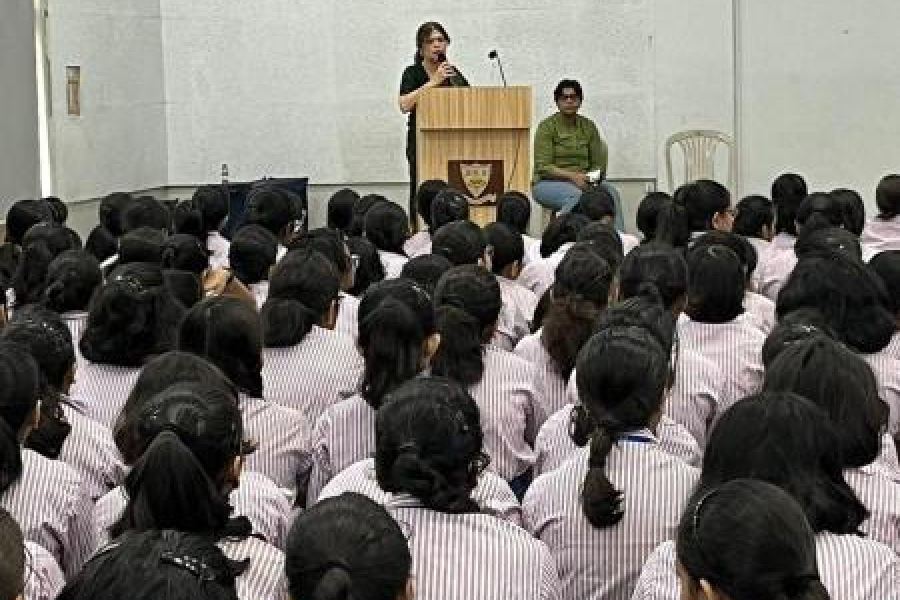Call body parts, including reproductive organs, by their right names and question taboos and myths — even if parents are passing them on — two doctors told a roomful of adolescent girls.
A gynaecologist and endocrinologist were addressing Class VI girls and their parents, mostly mothers, at Modern High School for Girls on "growing up" and knowing your body "outside and inside".
During the 90-minute session on July 3, the girls came up with questions whose answers challenged family norms and social customs and burst the myths around menstruation.
Many homes and the society they live in still follow practices that defy logic or science.
"We need to think about what we are being told and question what we are being told, even if it is from people we love and trust. It is not a betrayal of love or relationship if I am questioning something my mother told me," said endocrinologist Madhurima Vidyarthi.
Vidyarthi said it does not make the father or the mother a bad parent because teaching and conditioning have changed over generations but age-old traditions still work very strongly on the mind.
She stressed the need to call the body parts by their right names, instead of giving it any other name.
"We have shown you the slides and there are books on anatomy and information about the right names. It is important to use them. Knowing the body is important to know how to take care of and protect it," she told the girls.
The doctors spoke about menstruation, the need to maintain hygiene and change sanitary towels frequently because one is vulnerable to infections. They also discussed fertilization and implantation.
Menstruation is scientific and not to be hidden behind doors or not be discussed with friends, the girls were told while their parents listened.
Some families still do not allow women to enter the kitchen while menstruating or the men in the family cannot buy sanitary towels or napkins.
The familiar practice of wrapping sanitary towels in black plastic or newspaper is hard to get rid of even in this day and age.
Gynaecologist Gitasree Mukherjee told the audience "period blood is not unclean" contrary to popular belief.
"A lot of people also believe that girls are impure during the time of their period. They are dirty and the blood that is coming out is unclean. Period blood is not unclean. It is the same blood that is flowing in your veins and it is just coming out mixed with some tissues from the uterus," Mukherjee said.
She said many girls or women hide that they are having their period and are unable to talk about their problems.
The school wrote to the parents, inviting them to the session to help their daughters understand the transition from childhood to adolescence, which is "happening earlier" than it did a decade back.
"It is important that you join this session with your daughters as they are 'educated' about the changes that they are undergoing and are at times driven to look at incorrect and often misguided sources of information to quench their curiosity or find answers to anxieties," the school had written to parents.
Principal Damyanti Mukherjee later told The Telegraph that even in a "liberal, progressive, thoughtful, mindful school" there were contradictions and it was important to have open conversations.
"It is important for girls to understand that it is their right to ask questions and seek answers from the right sources," the principal said.
"We have noticed these contradictions when the questions are penetrative and disturbing and parents are not ready to answer them. We should not have children growing up in a contradictory environment or in an environment that suppresses or has a different version of truth," principal Mukherjee said.
The girls and their mothers had questions which were answered by Gitasree Mukherjee.
How safe it is to use a tampon and when can it be introduced?
Mukherjee: Tampons are introduced depending on how comfortable girls are. Only if a girl is comfortable it is given to her. The age can vary. But you have to teach her how to use it and the safety precautions as well. It should not be used for more than eight hours.
Why does one have mood swings during periods?
Mukherjee: Mood swings are common mainly because of the hormonal fluctuations that are happening.











